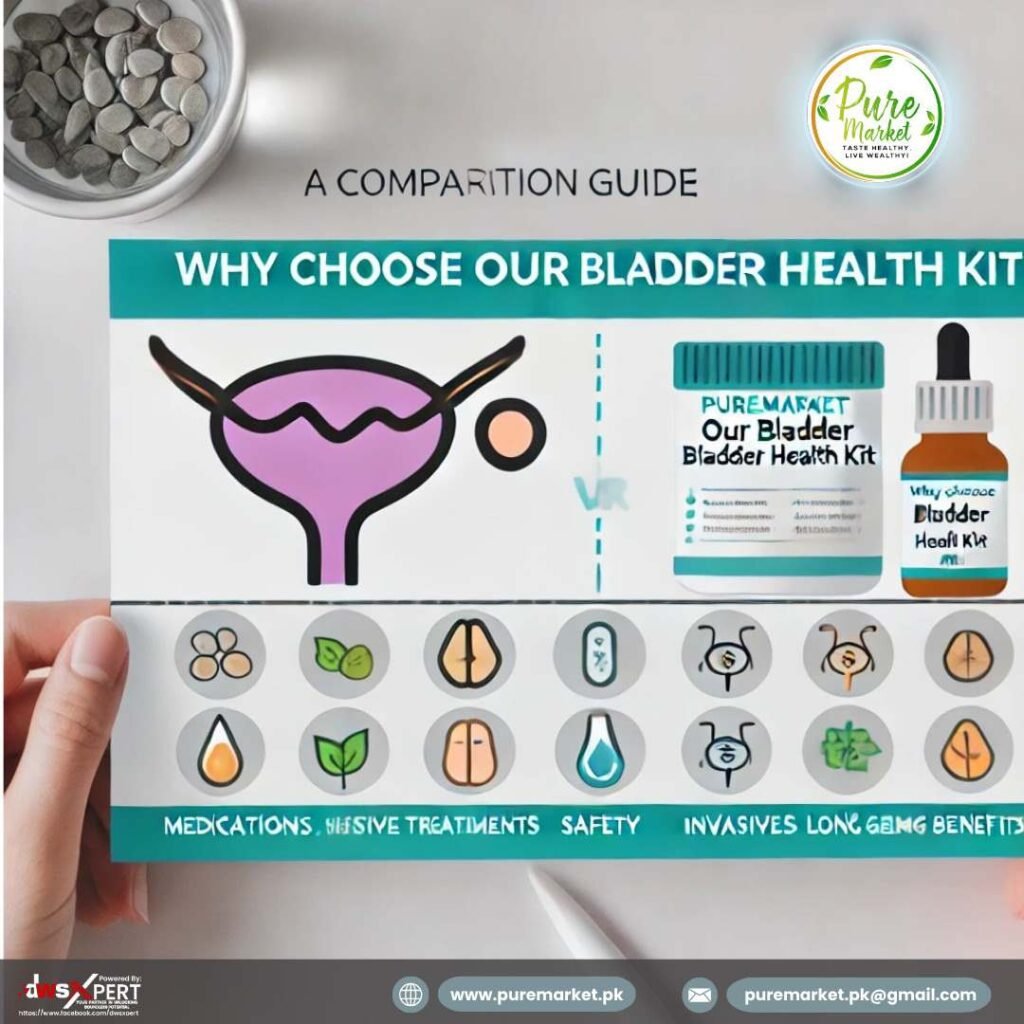
The Importance of Exercise in PCOS Management

Polycystic Ovary Syndrome (PCOS) is a common endocrine disorder that affects many women worldwide. One of the most effective ways to manage PCOS symptoms is through regular physical activity. Exercise plays a crucial role in improving insulin sensitivity, regulating menstrual cycles, and promoting overall health. At PureMarket.pk, we believe in a holistic approach to managing PCOS, incorporating diet, natural remedies, and exercise. In this blog, we will discuss the importance of exercise in managing PCOS, recommended types of exercise, and how to create an exercise plan tailored for PCOS patients.
The Role of Physical Activity in Managing PCOS
Exercise has numerous benefits for women with PCOS, helping to manage symptoms and improve overall quality of life. Here’s how physical activity can make a significant difference:
- Improving Insulin Sensitivity
Insulin resistance is a common issue for women with PCOS, leading to higher insulin levels and exacerbating symptoms. Regular exercise helps improve insulin sensitivity, allowing the body to use insulin more effectively and reducing blood sugar levels.
- Promoting Weight Loss
Weight gain and difficulty losing weight are common challenges for women with PCOS. Exercise helps burn calories, increase metabolism, and promote weight loss, which can alleviate many PCOS symptoms and improve hormonal balance.
- Regulating Menstrual Cycles
Physical activity can help regulate menstrual cycles by balancing hormones. Regular exercise promotes the production of endorphins and reduces levels of cortisol, the stress hormone, contributing to more regular periods.
- Reducing Inflammation
Chronic inflammation is associated with PCOS and can worsen symptoms. Exercise has anti-inflammatory effects, helping to reduce inflammation and support overall health.
- Enhancing Mood and Mental Health
Women with PCOS often experience mood swings, depression, and anxiety. Exercise releases endorphins, which can improve mood and reduce symptoms of depression and anxiety, enhancing overall mental well-being.
Recommended Types of Exercise for PCOS
Not all exercises are created equal when it comes to managing PCOS. Here are some of the most effective types of physical activity for women with PCOS:
- Cardiovascular Exercise
Cardiovascular exercise, or cardio, is excellent for improving heart health, burning calories, and reducing insulin resistance. Aim for at least 150 minutes of moderate-intensity cardio per week. Effective cardio exercises include:
- Brisk Walking: A low-impact exercise that can be done anywhere.
- Jogging or Running: Great for cardiovascular health and burning calories.
- Cycling: Can be done outdoors or on a stationary bike.
- Swimming: A full-body workout that is easy on the joints.
- Dancing: A fun way to get your heart rate up and burn calories.
- Strength Training
Strength training helps build muscle mass, increase metabolism, and improve insulin sensitivity. Aim to include strength training exercises at least two to three times per week. Effective strength training exercises include:
- Weight Lifting: Using free weights or weight machines.
- Resistance Band Exercises: Versatile and can be done at home or the gym.
- Bodyweight Exercises: Squats, lunges, push-ups, and planks.
- Pilates: Focuses on core strength and flexibility.
- Flexibility and Relaxation Exercises
Flexibility and relaxation exercises help reduce stress, improve flexibility, and support overall well-being. Include these types of exercises in your routine:
- Yoga: Combines physical postures, breathing exercises, and meditation.
- Stretching: Helps improve flexibility and reduce muscle tension.
- Tai Chi: A gentle form of exercise that promotes relaxation and balance.
Creating an Exercise Plan Tailored for PCOS Patients
Creating a personalized exercise plan is essential for managing PCOS effectively. Here are some steps to help you design a plan tailored to your needs:
- Set Realistic Goals
Start by setting realistic and achievable fitness goals. Whether it’s losing weight, improving insulin sensitivity, or reducing stress, having clear goals will keep you motivated and focused.
- Choose Activities You Enjoy
Exercise should be enjoyable, not a chore. Choose activities you like and look forward to doing. This will make it easier to stick to your exercise routine.
- Start Slow and Progress Gradually
If you’re new to exercise, start with low-intensity activities and gradually increase the intensity and duration as your fitness improves. This approach helps prevent injury and makes it easier to stick with your routine.
- Mix It Up
Incorporate a variety of exercises into your routine to keep things interesting and target different muscle groups. A mix of cardio, strength training, and flexibility exercises will provide comprehensive benefits.
- Schedule Regular Workouts
Consistency is key to seeing results. Schedule regular workouts and make them a non-negotiable part of your routine. Aim for at least 30 minutes of exercise most days of the week.
- Listen to Your Body
Pay attention to how your body responds to exercise. If you feel pain or extreme discomfort, adjust your routine accordingly. Rest and recovery are just as important as the workouts themselves.
Sample Exercise Plan for PCOS
Here’s a sample weekly exercise plan tailored for women with PCOS:
Monday:
- 30 minutes of brisk walking
- 15 minutes of bodyweight exercises (squats, lunges, push-ups)
Tuesday:
- 30 minutes of cycling
- 15 minutes of stretching and flexibility exercises
Wednesday:
- 30 minutes of swimming
- 15 minutes of resistance band exercises
Thursday:
- 30 minutes of jogging
- 15 minutes of yoga
Friday:
- 30 minutes of dancing
- 15 minutes of weight lifting (upper body focus)
Saturday:
- 30 minutes of brisk walking
- 15 minutes of Pilates
Sunday:
- Rest day or gentle stretching
Personal Stories: Real Women, Real Success
Hearing from other women who have successfully managed their PCOS symptoms through exercise can be incredibly motivating. Here are a few personal stories:
Maria’s Transformation
Maria, a 32-year-old woman from Karachi, struggled with weight gain and irregular periods due to PCOS. She started a regular exercise routine that included brisk walking and yoga. Within a few months, Maria noticed significant improvements in her menstrual regularity and overall energy levels. Her commitment to a consistent exercise routine has transformed her life, and she now enjoys a healthier, more active lifestyle.
Fatima’s Journey
Fatima, a 28-year-old from Lahore, experienced severe acne and mood swings due to PCOS. She incorporated strength training and cardio exercises into her routine, along with stress management techniques like meditation. Over time, Fatima’s skin cleared up, and her mood improved significantly. Fatima’s journey highlights the power of a holistic approach to managing PCOS symptoms.
Conclusion
Exercise is a powerful tool for managing PCOS symptoms and improving overall health. By incorporating regular physical activity into your routine, you can enhance insulin sensitivity, promote weight loss, regulate menstrual cycles, and boost mental well-being. At PureMarket.pk, we are committed to supporting women with PCOS through our range of organic supplements, personalized diet plans, and holistic lifestyle recommendations. By following a balanced exercise plan tailored to your needs, you can take control of your PCOS and lead a healthier, more fulfilling life.
Stay tuned for our next article, where we will explore the benefits of our PCOS Balance Kit and how it can support your journey to better health.
Related Articles
Lorem ipsum dolor sit amet consec fusce purus bibendum eget dui dictum quam tristique.


Customer testimonials and success stories

